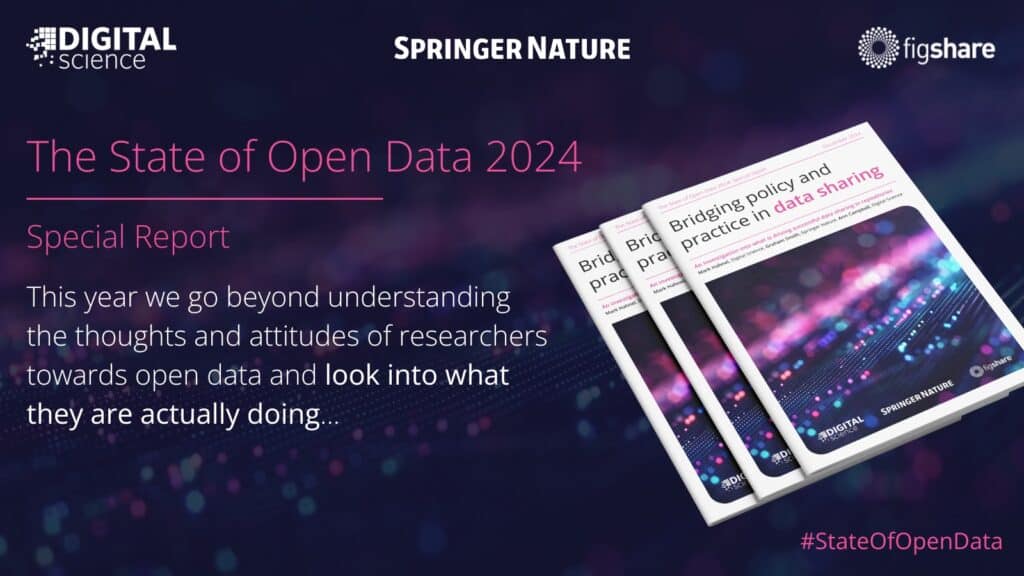New report suggests open data on edge of becoming a recognized global standard for scholarly output
Latest report in the State of Open Data series, released by partners Digital Science, Figshare and Springer Nature, provides quantitative analysis on growth of open data sharing globally
Monday 2 December 2024
New analysis suggests that open data practice is now on the edge of becoming a standard, recognized and supported scholarly output, globally.
As part of the latest in the State of Open Data series, produced by partners Digital Science, Figshare and Springer Nature, direct author-sharing practices have been analyzed from a funder, country and institutional level. The resulting data shows key trends driving successful open sharing and the growth of global adoption, while also enabling recommendations to be drawn to help bridge the remaining gaps between policy and practice.
The findings have been published in The State of Open Data 2024 special report: Bridging policy and practice in data sharing.
Report co-author Mark Hahnel, VP of Open Research at Digital Science and Founder of Figshare, said:
“Open research is now officially an inevitability. If we look at open research in general and closed vs open publishing, there is now more open publishing than closed. We’re now in a place where we consistently see around 2 million datasets being published every year; this is the same amount of articles that we saw published annually in the year 2000. This report provides a valuable insight into what is really driving this data sharing and enables us, as a community, to see what is working and what we need to do more of to both sustain these figures and increase them.”
Key findings from the report show that:
- More universities now have data sharing policies as part of their efforts to promote open science and research transparency.
There has been a strong growth in papers linking to data from universities globally since 2010. Although there are differences regionally, with a spread of just 5-10% in data sharing policies, this is less significant than the number of articles (>85%) that were previously not linked to data.
- The success of open data initiatives reflects a broader policy environment. However, having policies in place is not sufficient on its own.
Policies for open data sharing are now more consistent globally, which has contributed to a general decline in “on request” sharing with reductions ranging from 1-9% in all but one country – i.e. researchers are now sharing more ‘naturally’. However, there are fluctuations in practice based on the type of research being funded and geolocation, and even where policies are in place, there is not necessarily a significant rise in repository sharing.
- Global uptake of open research practice has increased, but is impacted by country-level motivations for data sharing.
The United States has the lowest percentage of researchers that are motivated through citation of their data (4.88%) while having the highest percentage being motivated by funder requirement (10.23%). Conversely, Ethiopia and Japan show similarity with a higher importance of motivation through citation of their data (9.3% and 14.8% respectively) and a similar low importance of motivation from funder requirement (at 2.33% and 1.67% respectively).
- Resource disparities remain.
Progress in some countries is hindered by limitations in internet connectivity, institutional support, and a lack of awareness. Across the 10 regions analyzed*, the US, UK, Germany, and France demonstrated similar trends in repository sharing, averaging around a 25% sharing rate. However, for Brazil, Ethiopia and India the sharing rate remains significantly below a quarter.
- Sustained efforts are needed to respond to the challenges in diverse research areas.
A wide range of disciplines are now being covered by the growing number of data availability statement (DAS) policies, but many still lack established community practices, suitable repositories, and/or the ability to handle sensitive data which is difficult to share.
Report co-author Graham Smith, Open Data Programme Manager, Springer Nature said:
“Our aim with this report is to help open up the conversations we need to have around open data and research practices. Providing global data that helps to recognise and address the disparities in practice, we can identify as a sector the targeted and practical next steps needed to further accelerate the global adoption of open data practices. In doing so, we can foster a more equitable and accessible research ecosystem, where data sharing is valued, rewarded, and ultimately becomes a cornerstone of academic success – key if we are to move to a fully open science future.”
This year’s focused report combines three different data sources: Dimensions, Springer Nature Data Availability Statements, and the Make Data Count and DataCite Data Citation Corpus, to look at the linkages between peer-reviewed published research and data sets being made available. The combination of these sources has enabled patterns to be analysed around how researchers are making their data open, to what standard, and better understand the real motivations for data sharing, to help inform how we as a community can effect positive change.
Alongside the analysis of researcher actions, the report also suggests four ways in which to continue to drive progress forwards: consistent introduction of a four-step process of change (policy, mandate compliance and measurement); enhanced collaboration for equitable access to knowledge; an increase in training and identification of the regions that need more targeted support; and greater acknowledgement, by all, of the nuances by discipline.
The results of this year’s analysis will be discussed in a webinar on 23 January 2025. Register for the webinar here and join the conversation at #StateOfOpenData.
All data and analysis can be accessed in the report hosted on Figshare here: https://doi.org/10.6084/m9.figshare.27337476
*The 10 countries included in the country-level analysis were: Botswana, Brazil, China, Ethiopia, France, Germany, India, Japan, the United Kingdom, and the United States.
About Figshare
Figshare, a Digital Science Solution, is a provider of institutional repository infrastructure. Our solutions help institutions share, showcase and manage their research outputs in a discoverable, citable, reportable and transparent way. We support institutions in meeting the growing demands for research to become open, freer, FAIRer and more connected. We provide the flexibility and control for you to create research management workflows that work for you. We take care of implementation, updates, security and maintenance – ensuring you and your researchers can always depend on your repository, leaving you to focus on what really matters; research and its impact on the world.
About Digital Science
Digital Science is an AI-focused technology company providing innovative solutions to complex challenges faced by researchers, universities, funders, industry and publishers. We work in partnership to advance global research for the benefit of society. Through our brands – Altmetric, Dimensions, Figshare, IFI CLAIMS Patent Services, metaphacts, OntoChem, Overleaf, ReadCube, Scismic, Symplectic, and Writefull – we believe when we solve problems together, we drive progress for all. Visit digital-science.com and follow Digital Science on Bluesky, on X or on LinkedIn.
About Springer Nature
At Springer Nature, we are proud to be part of progress, working together with the communities we serve to share knowledge and bring greater understanding to the world. Every day our books, journals, platforms, and technology solutions reach millions of people; helping researchers to uncover new ideas and share their discoveries, health professionals to stay at the forefront of medical science, and educators to advance learning. Through our leading brands, trusted for more than 180 years, and our steadfast commitment to the most rigorous standards, we help accelerate solutions to the world’s urgent challenges and inspire generations to come. For more information, please visit about.springernature.com and @SpringerNature.
Media contacts
David Ellis, Press, PR & Social Manager, Digital Science: Mobile +61 447 783 023, d.ellis@digital-science.com
Laura Day, Marketing Director, Figshare: laura@figshare.com
Theodore HibbertGreaves, Communications Officer, Springer Nature: theodore.hibbertgreaves@springernature.com




